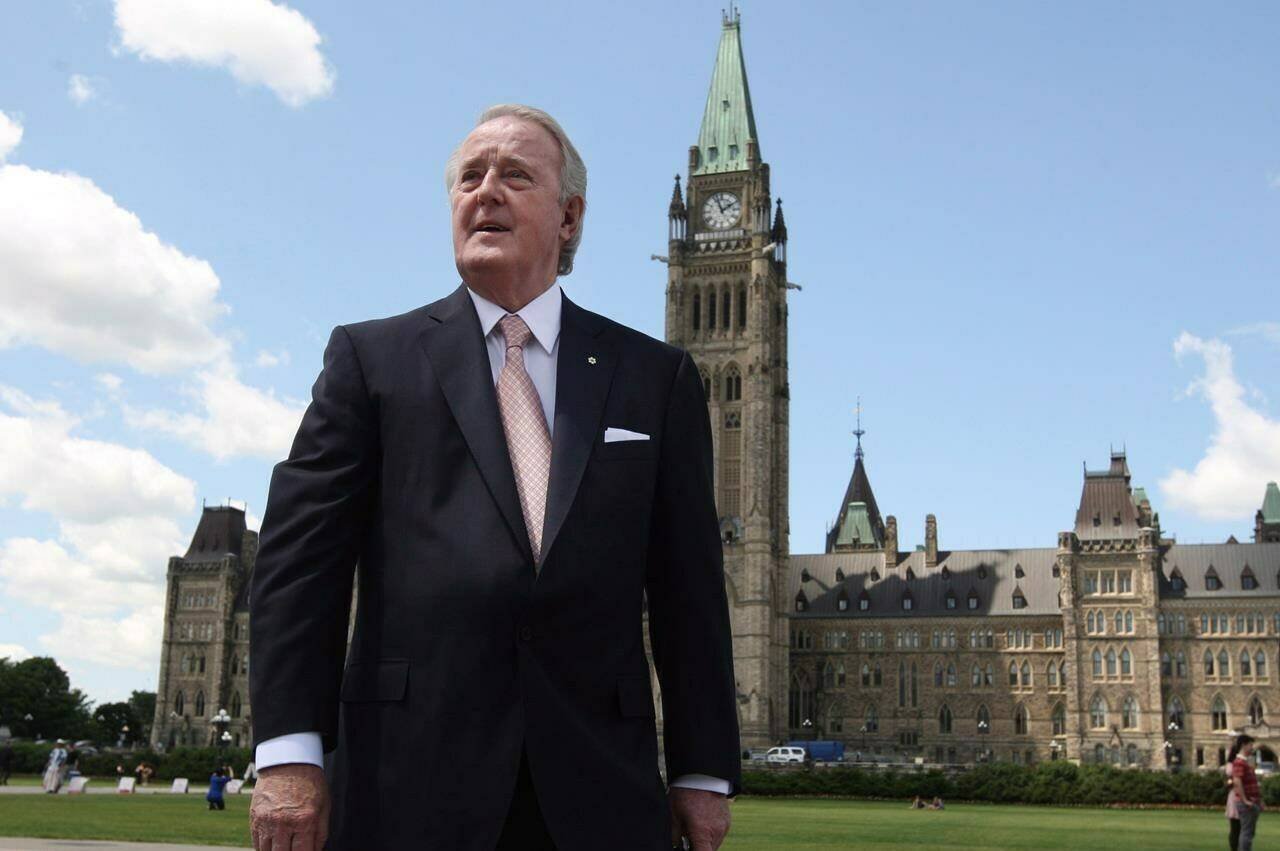The flag fluttered at half-mast on Parliament’s Peace Tower and several provincial legislatures on Friday as Canadians paid tribute to former prime minister Brian Mulroney.
“Canada is in mourning,” said a visibly emotional Liberal House leader Steve MacKinnon in the House of Commons, where a book of condolences was set up for members of Parliament to sign.
Mulroney died Thursday in a Florida hospital following a recent fall at his Palm Beach home. He was 84. He had been treated for prostate cancer almost a year ago and underwent a heart procedure in August.
READ MORE: Brian Mulroney, a PM with little middle ground in Canada’s hearts, dead at 84
Prime Minister Justin Trudeau confirmed there would be a state funeral to honour the Progressive Conservative titan, who held the prime minister’s post for nearly nine years.
Trudeau said details on the timing are being worked out with Mulroney’s family. There will also be opportunity for the public to offer their condolences, he added.
The House of Commons was scheduled to sit Friday before a two-week break, but MPs agreed to suspend until March 18, when they will officially pay tribute to Mulroney.
Friday’s steady stream of condolences punctuated the degree to which Mulroney left a lasting mark on the country and its people.
“It’s just hard to imagine politics in Canada without Brian Mulroney,” said David McLaughlin, Mulroney’s former chief of staff.
“I’m sad for him, sad for his family, and I’m kind of sad for the country because I don’t think we’ll see the likes of a Brian Mulroney again.
“He was truly a giant in Canadian politics.”
The world “giant” has been used by multiple people to describe Mulroney in recent days, and McLaughlin said there is no better word for a man who repeatedly tried to do big things for the country.
The charismatic and compelling leader with convictions as deep as his trademark languid baritone led the country as the leader of the Progressive Conservatives from 1984 until 1993.
He reinvented cross-border relations thanks to a close friendship with U.S. President Ronald Reagan, a relationship that helped usher in the era of continental free trade and bilateral environmental treaties.
He led the way on a global treaty to rid the world of ozone-depleting pollutants, and with Reagan successor George H.W. Bush signed a cross-border pact to cut down on the air pollution that causes acid rain.
The close ties he maintained with Reagan and Bush were evident when he was asked to speak at both of their funerals, as well as the funeral for Reagan’s wife, Nancy.
For many, Mulroney will always be the prime minister who introduced the GST — a bold and necessary move, he insisted, but one that came with lasting political damage.
He also twice tried to garner agreement from the provinces to amend the Constitution in a bid to bring Quebec on side.
Although both of those constitutional amendments failed, they showed how high Mulroney was willing to reach, McLaughlin said.
U.S. President Joe Biden said he got to know Mulroney as a member of the Senate Foreign Relations Committee.
“I saw firsthand his commitment to the friendship between our two nations, as well as his abiding love for Canada and its people,” Biden said in a statement Friday.
In South Africa, Mulroney was lauded for being a staunch ally against apartheid. He led a campaign among Commonwealth countries threatening sanctions against South Africa if it didn’t release Nelson Mandela from prison and dismantle apartheid laws.
“Mulroney led Canada during a critical decade in which our struggle for freedom culminated in the dismantling of apartheid,” President Cyril Ramaphosa said in a statement Friday.
Mulroney’s death is more profound because it comes as South Africa is marking “30 years of freedom,” he added.
“During his term, he spoke out against apartheid, advocated the economic isolation of the regime and took a stand when many in the international community were wavering.”
Ukrainian President Volodymyr Zelenskyy also sent condolences on behalf of his country.
“Ukrainians will always remember” that Mulroney’s was the first western government to recognize Ukraine as an independent country in 1991, he said on X.
While the accolades poured in for the former prime minister, Canadians were also reminded that Mulroney pulled people through the gamut of emotions during his tenure.
His first government in 1984 still holds the distinction of being the largest majority in Canadian history. Nine years later, however, Mulroney was so deeply unpopular that his successor, Kim Campbell, managed to win just two seats in 1993.
In his post-prime ministerial life, Mulroney took on the role of an elder statesman sought out by premiers, cabinet ministers and prime ministers for his political wisdom and acumen.
Erin O’Toole, a former Conservative MP and party leader, said he counted Mulroney as a close friend and mentor who “would always be there, in thick and thin.”
“It’s a sign of character that you don’t see much in politics,” O’Toole said in an interview.
“There’ll be a lot of people there when the skies are sunny, but on a cloudy day, he would call when a lot of others wouldn’t.”
Bob Rae, whose single term as NDP premier in Ontario coincided with the end of Mulroney’s time as prime minister, concurred.
“When my brother died, Brian Mulroney was the first political leader to call, as he was when I was elected premier in 1990, when I was defeated, and at so many other moments,” Rae said.
Despite being a fierce partisan fighter, Mulroney always had Canada’s best interest at heart, said O’Toole — an example he said he tried to follow as Conservative leader.
“He always said, put the long-term well-being of the country at the forefront of everything you do.”
Mia Rabson, The Canadian Press
READ MORE: Mulroney’s death sparks wave of tributes from across Canada

